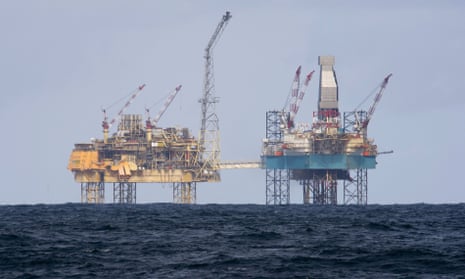Shell has sold a large part of its North Sea oil fields for $3.8bn (£3bn) to a company headed by Linda Cook, who left the Anglo-Dutch group more than seven years ago after missing out on the top job.
American-born Cook, nicknamed the first lady of oil and gas by the City, had been at Shell for 29 years and was latterly in charge of the group’s gas and renewables businesses. She was a frontrunner to become chief executive, but instead Peter Voser was appointed to the post and Cook resigned.
She was controversially awarded a $7.6m severance payment, and Shell also doubled her pension pot to almost $25m, prompting criticism from shareholder groups.
Now she will become chair of private equity-backed oil group Chrysaor after it snapped up the package of oil fields put up for sale by Shell. The deal will be partly funded by Harbour Energy, which is part of the US investment giant EIG and where Cook has been managing director since 2014.
The assets sold by Shell accounted for more than half of the company’s North Sea oil production last year and includes fields gained after Shell acquired gas giant BG Group for £47bn.
More than 400 jobs will be transferred to Chrysaor, which will become one of the UK’s biggest oil and gas producers after the sale is completed in the second half of this year.
The move takes place two days before Shell is due to publish its 2016 full-year results and is part of its programme to reduce its debts by divesting $30bn of assets by 2018. The sale also comes shortly before the group is expected to submit its formal plan to government for dismantling its rigs at Brent, a field which has produced about 10% of total North Sea production over four decades.
Shell will still have a fixed liability of $1bn for decommissioning the assets sold to Chrysaor but otherwise avoids the estimated $3.9bn cost of cleaning up the rigs at the end of their life, which is expected to be more than two decades away.
Andy Brown, Shell’s upstream director, said: “This deal complements the great strides we have made over the last two years in improving the competitiveness of our UK upstream business.”
Chrysaor said the acquisition demonstrated its belief that North Sea oil and gas production had real future potential. “Chrysaor is acquiring a high quality package of assets which combine low-cost production, a substantial reserves and resources base with strong cash flows and a highly competent and skilled workforce,” said Phil Kirk, its chief executive.
The deal covers Shell’s interests in the fields Buzzard, Beryl, Bressay, Elgin-Franklin, J-Block, the Greater Armada cluster, Everest, Lomond and Erskine, and a 10% stake in Schiehallion. Shell also announced on Tuesday that it had sold its stake in a Thai gas field for $900m to a subsidiary of the Kuwait Foreign Petroleum Exploration Company.
Oil majors have been reducing their footprint in the relatively high cost North Sea in favour of lower cost production elsewhere. Earlier this month, BP sold a 25% stake in the Magnus field to Enquest, another UK independent oil and gas company.

Comments (…)
Sign in or create your Guardian account to join the discussion